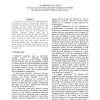355 search results - page 17 / 71 » The YAGO-NAGA approach to knowledge discovery |
CSE
2009
IEEE
14 years 3 months ago
2009
IEEE
—The hidden knowledge in social networks data can be regarded as an important resource for criminal investigations which can help finding the structure and organization of a crim...
IJCSA
2007
13 years 8 months ago
2007
This paper discusses different approaches for integrating biological knowledge in gene expression analysis. Indeed we are interested in the fifth step of microarray analysis pro...
CIMCA
2006
IEEE
14 years 2 months ago
2006
IEEE
In this paper, a distributed and adaptive approach for resource discovery in peer-to-peer networks is presented. This approach is based on the mobile agent paradigm and the random...
PKDD
2007
Springer
14 years 2 months ago
2007
Springer
Most knowledge discovery processes are biased since some part of the knowledge structure must be given before extraction. We propose a framework that avoids this bias by supporting...
CINQ
2004
Springer
14 years 5 days ago
2004
Springer
Inductive databases (IDBs) have been proposed to afford the problem of knowledge discovery from huge databases. With an IDB the user/analyst performs a set of very different operat...

